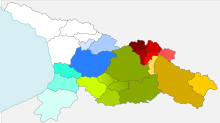 Distribution of the Meskhetian dialect Distribution of the Meskhetian dialect | |
| Total population | |
|---|---|
| c. 89,995 - 100,000 | |
| Regions with significant populations | |
Samtskhe-Javakheti: 77 498 or 48,3 % (2014) Ardahan province: unknown | |
| Languages | |
| Meskhetian dialect of Georgian language | |
| Religion | |
| Predominantly † Georgian Orthodox Church Catholic, Jewish and Muslim minority. |
| Part of a series on |
| Georgians ქართველები |
|---|
 The The Kartvelian people |
| Nation |
| Georgia |
| Ancient Kartvelian people |
| Subgroups |
| Culture |
| Languages |
| Religion |
| Symbols |
| History of Georgia |
Meskhians (Georgian: მესხები, Meskhebi) are an ethnographic subgroup of Georgians who speak the Meskhetian dialect of the Georgian language, which among Georgia's regional dialects is relatively close to official Georgian. Meskhetians are the indigenous population of Meskheti, a historical region in southern Georgia. Today they are mainly followers of Georgian Orthodox Church, while part of them are Catholics.
History
Several authors have connected Meskhetians or Meskhians to Mushki tribe or Moschoi (Μόσχοι) in Greek sources, who were an Iron Age people of Anatolia. Meskhian tribes came to the fore, gradually moving northeast and forming their settlements in the very heart of Kartli. Mtskheta, the ancient capital of Iberia (literarily means "town of Meskhs") was one such settlement, deriving its name from the ethnonym "Meskhians". According to the Cyril Toumanoff, Moschians were the early proto-Georgian tribe which played a leading role in the consolidation of Iberian tribes largely inhabiting eastern and southern Georgia.
Between 9th-11th centuries Mesketi, also known as Tao-Klarjeti, was governed by the Bagrationi dynasty and the region played a crucial role in the unification of the Georgian principalities into a single Georgian state in 1008. Meskheti gave many prominent people to the Georgia: such as Shota Rustaveli, who is considered to be the preeminent poet of the Georgian Golden Age and one of the greatest contributors to Georgian literature. Rustaveli is the author of The Knight in the Panther's Skin, which is considered to be a Georgian national epic poem.
Thereafter, the kingdom of Georgia declined and eventually disintegrated under hegemony of various regional powers, including the Mongols, Timurids, Black and White Sheeps. After the Mongol invasion of Georgia, Meskhetian princes gained virtual independence from the Georgian crown and established Principality of Samtskhe under the Mongol patronage.
By the Peace of Amasya (1555), Principality of Samtskhe was divided into two, with the Safavids keeping the eastern part and the Ottomans gaining the western part. In 1578, the Ottomans performed a successful invasion into the Safavid possessions in Georgia, initiating the Ottoman-Safavid War of 1578-1590, and by 1582 they were in possession of the eastern (Safavid) part of Meskheti as well.
The Georgian population of Meskheti was displaced to inner regions of Georgia such as Imereti and Kartli. Those who remained gradually became Muslim, the process is also known as Turkification of Meskhetians (then Meskhetian Turks).
Notable Meskhetians
- Shota Rustaveli (c.1160—after c. 1220), medieval Georgian poet and author of The Knight in the Panther's Skin.
- Anthim the Iberian (1650—1716), Georgian theologian, scholar, calligrapher and philosopher.
- Michel Tamarati, Georgian Roman Catholic priest and historian.
- Vano Merabishvili, Georgian politician and former Prime Minister of Georgia from 4 July to 25 October 2012.
See also
References
- Georgian census, 2014
- "East of Center » Archive » Meskhetian Turks Bouncing From Exile to Exile". Retrieved 2016-06-10.
- "ECMI - European Centre for Minority Issues: Publications". www.ecmi.de. Retrieved 2016-06-10.
- Cyril Toumanoff, Studies in Christian Caucasian History, p 80
- Mikaberidze 2015, p. xxxi.
- Floor 2001, p. 85.
- Khazanov 1995, 195.
Sources
- Floor, Willem (2001). Safavid Government Institutions. Costa Mesa, California: Mazda Publishers. ISBN 978-1568591353.
- Khazanov, Anatoly Michailovich (1995). After the USSR: Ethnicity, Nationalism and Politics in the Commonwealth of Independent States. University of Wisconsin Press. ISBN 0-299-14894-7.
- Mikaberidze, Alexander (2015). Historical Dictionary of Georgia (2nd ed.). Lanham, Maryland: Rowman & Littlefield. ISBN 9781442241466.
| Ethnic Georgians | |
|---|---|
| See Also: Ethnic groups in the Caucasus | |